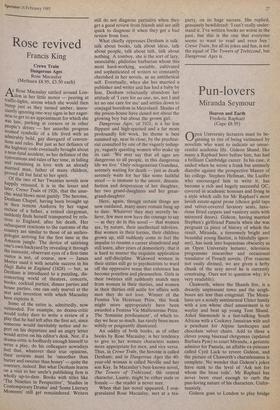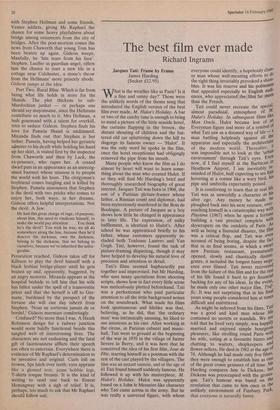Pun-lovers
Miranda Seymour
Heaven and Earth Frederic Raphael (Cape £8.95)
Open University lecturers must be be- ginning to tire of being victimised by novelists who want to indicate an unsuc-
cessful academic life. Gideon Shand, like many a Raphael hero before him, has had a brilliant Cambridge career. In his case, it ended when he wrote a frank but untimely diatribe against the prospective Master of his college. Stephen Hellman, the Lucifer who encouraged him to write it, has become a rich and hugely successful QC, covered in academic honours and living in a style which calls for Mr Raphael's most lavish estate-agent prose (choice gold taps and velvet-covered lavatory seats, luxu- rious fitted carpets and vanitory units with mirrored doors). Gideon, having married Stephen's girlfriend Pamela when she was pregnant (a piece of history of which the result, Miranda, a tiresomely bright and beautiful young flautist, is blissfully ignor- ant), has sunk into loquacious obscurity as an Open University lecturer, television programme researcher and occasional translator of French novels. (For reasons not easily divined, we are given a hefty chunk of the sexy novel he is currently construing. Ours not to question why; it's Very readable).
Chaworth, where the Shands live, is a drearily unpleasant town and the neigh- bours are less than congenial. The Mona- hans are a noisily sentimental Ulster family with a son whose chief amusement is to waylay and beat up young Tom Shand. Athol Simmonds is a fast-talking South African with a Cockney Jamaican wife and a penchant for Alpine landscapes and chocolate velvet chairs. Add to these a clever young bisexual clergyman (updated Barbara Pym) to court Miranda, a geriatric admirer for Pamela, an affable ex-prisoner called Cyril Lack to revere Gideon, and the picture of Chaworth's charmlessness is complete. No wonder that Gideon's jokes have sunk to the level of `Ask not for whom the beau toils'. Mr Raphael has never been cruel enough to curb the pun-loving nature of his characters. Unfor- tunately.
Gideon goes to London to play bridge with Stephen Hellman and some friends, Venice addicts, giving Mr Raphael the chance for some heavy playfulness about bridge among ornaments from the city of bridges. After the post-mortem comes the news from Chaworth that young Tom has been beaten up again. , Gideon weeps. Manfully, he 'hits tears from his face'. Stephen, Lucifer as guardian angel, offers him the chance to start a new life in a cottage near Colchester, a stone's throw from the Hellmans' more princely abode. Gideon jumps at the idea.
Part Two. Rural Bliss. Which is far from being what life holds in store for the Shands. The plot thickens to sub- Murdochian junket — or perhaps one should say mayonnaise, since the Hellmans contribute so much to it. Mrs Hellman, a lush gourmand with a talent for overkill, tries to seduce Gideon. Stephen finds his love for Pamela Shand is undimmed. Miranda finds out that Stephen is her father. Pamela, having helped her geriatric admirer to his death while holding his hand up her skirt, is visited first by the inspector from Chaworth and then by Lack, the ex-prisoner, who rapes her. A crazed dwarf puts in an appearance as an unrecog- nised baronet whose mission is to people the world with his heirs. The clergyman's boyfriend comes burgling and is killed by Stephen. Pamela announces that Stephen is the devil with two pricks who comes to enjoy her, both ways, in her dreams. Gideon offers helpful interpretations. Not the devil. A Jew.
He had this great charge of rage, of purpose, about him, this need to vindicate himself, to make the world pay attention . . . You think he's the devil? You wish he was; we all do somewhere along the line, because then he'd deserve the darkness, own the darkness, belong to the darkness, that we belong to ourselves, because we've inherited the unfor- givable.
Peroration reached, Gideon takes off for Kilburn to play the devil himself with a black lesbian bridge-player until he gets beaten up and, apparently, buggered, by an angry motorist. Miranda appears at the hospital bedside to tell him that his wife has fallen under the spell of a transvestite priest and that she herself is off to Ger- many, burdened by the prospect of the fortune she will one day inherit from Stephen. 'Nous ne sortirons jamais de ce bordel,' Gideon murmurs comfortingly.
Confused? No more than I was. A Heath Robinson design for a railway junction would seem baldly functional beside this tangled web of intercrossing lives. The characters are not endearing and the fatal gift of facetiousness afflicts their speech too often to entertain. Everywhere there is evidence of Mr Raphael's determination to be inventive and original. Curls loll on frowns, lips latch over teeth, eyes appraise like a glossed text, jeans hobble legs, T-shirts tongue breasts. It is the kind of writing to send one back to Ernest Hemingway with a sigh of relief. It is, perhaps, too much to ask that Mr Raphael should follow suit.















































 Previous page
Previous page